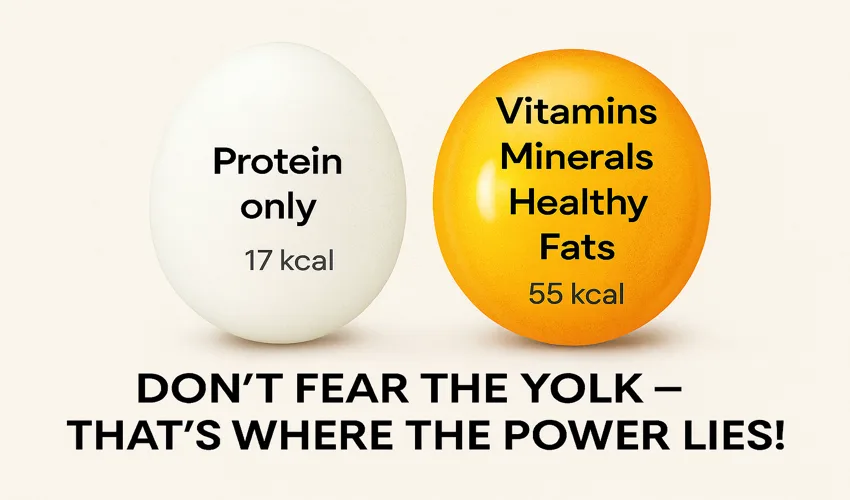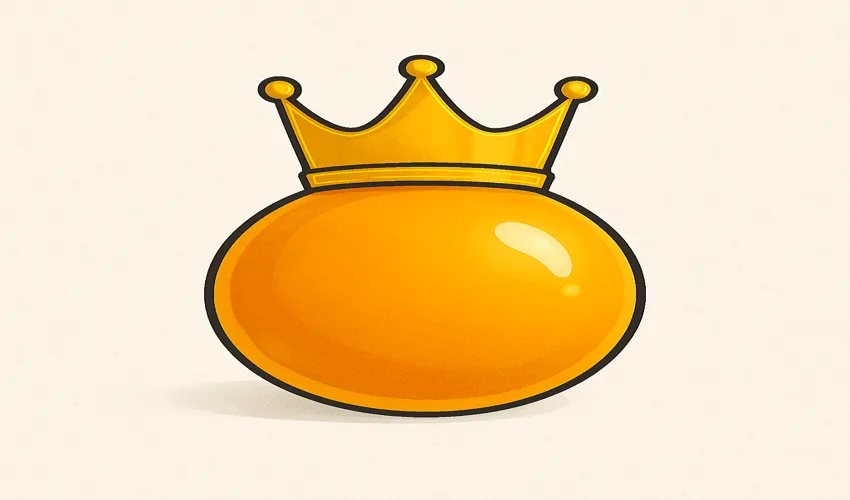Introduction: From Villain to Superfood
If there’s one food that has suffered the most from nutrition myths, it is the egg yolk. For decades, health advice was simple but misleading: “Eat the egg white, throw away the yolk.”
This advice was based on the belief that dietary cholesterol directly caused heart disease. Unfortunately, millions of people followed it without question. Even fitness enthusiasts were told to stick to plain egg-white omelettes, thinking they were making the “healthier” choice.
But over time, science began correcting itself. Large-scale studies revealed that the cholesterol in food does not have the same impact as cholesterol produced by the liver. In fact, trans fats—not egg yolks—were the true culprits behind high cholesterol and heart problems.
At Redial Clinic, Green Park, Delhi, we’ve witnessed this shift firsthand. Many of our diabetic and weight-loss patients initially come to us avoiding yolks. But once we reintroduce whole eggs into their diets, we often see improved satiety, stable blood sugars, and even better lipid profiles.
This blog uncovers the real truth about egg yolks—why they’re not just safe but actually essential for health.
What’s Inside an Egg Yolk? The Nutritional Breakdown

When you crack open an egg, the yolk stands out like liquid gold. But its value goes far beyond appearance.
The yolk is a concentrated source of nutrients. While the white contains almost pure protein, the yolk is where you’ll find the vitamins, minerals, healthy fats, and antioxidants.
Protein and Fat: The Perfect Balance
Each egg yolk provides about 2.7 grams of protein—not much compared to the white, but the proteins in yolks are highly bioavailable, meaning your body absorbs them easily.
Alongside protein, yolks contain 4.5–5 grams of fat, which is crucial. These fats are not “bad”—they’re mostly monounsaturated fatty acids (MUFA) and saturated, the type that supports heart and brain function. They also include omega-3s (especially if eggs are pasture-raised), which reduce inflammation.
This protein-fat combo makes yolks uniquely satisfying. Unlike carb-heavy breakfasts that cause sugar spikes and crashes, egg yolks provide steady energy and reduce hunger later in the day.
Calories in an Egg Yolk: Small but Mighty
A yolk carries about 55–60 calories. Compare that to the empty calories in processed snacks, and the difference is clear. Egg yolks are the definition of nutrient density—a small portion that delivers a powerhouse of nutrition.
In just one yolk, you’ll find:
- Vitamin A for healthy skin and vision.
- Vitamin D for strong bones and immunity.
- Vitamin E as an antioxidant.
- Vitamin K2 to regulate calcium and prevent arterial calcification.
- B vitamins (B12, folate, biotin) for energy and red blood cell formation.
- Choline—a nutrient most people are deficient in—that’s vital for brain function.
- Minerals like iron, zinc, and selenium.
In short: egg yolks are nature’s multivitamin.
Egg Yolk vs Egg White: The Real Winner
The “egg yolk vs egg white” debate is as old as modern nutrition advice. For years, egg whites were glorified, and yolks vilified. But let’s be honest—comparing them isn’t fair. They serve different purposes.
Egg whites provide lean protein with almost no calories or fat. This is why bodybuilders often use them when trying to meet high protein targets. But whites are virtually empty when it comes to micronutrients.
Egg yolks, on the other hand, carry almost everything the body needs apart from bulk protein: vitamins, minerals, antioxidants, and healthy fats. Without the yolk, you’re discarding 90% of the egg’s nutrition.
So, which is healthier? The truth is clear: egg yolks are superior in nutrient density. Whites may be useful for extra protein, but yolks are what make eggs one of the most complete foods available.
Cholesterol in Egg Yolk: Busting the Biggest Myth
For decades, the cholesterol in yolks was blamed for heart attacks. One yolk contains about 185 mg of cholesterol, and since health authorities once capped daily intake at 300 mg, people assumed eating eggs was risky.
But extensive modern studies tell a different story:
- Dietary cholesterol has little effect on blood cholesterol. The liver regulates cholesterol production and adjusts based on diet.
- Eggs raise HDL (“good” cholesterol). High HDL levels are protective against heart disease.
So rather than being harmful, eggs actually improve cholesterol profiles in many people. The myth that yolks clog arteries is simply outdated.
At Redial Clinic, we now encourage patients—even those with high cholesterol—to eat whole eggs. The real danger lies in processed oils, refined carbs, and sugar—not in the humble yolk.
Health Benefits of Egg Yolks
Egg yolks aren’t just “safe”—they’re beneficial for nearly every system in the body.
Brain Health and Cognitive Function
Egg yolks are the richest natural source of choline, a nutrient critical for the production of acetylcholine, a neurotransmitter involved in memory and learning. Pregnant women especially benefit, as choline supports fetal brain development. Deficiency is linked to cognitive decline and fatty liver.
Eye Protection and Healthy Vision
The antioxidants lutein and zeaxanthin found in yolks accumulate in the retina. They protect against oxidative damage and lower the risk of cataracts and age-related macular degeneration—the leading cause of blindness in older adults.
Hormonal Balance
Hormones like estrogen, progesterone, and testosterone are built from cholesterol. Without dietary cholesterol, the body struggles to maintain balance. Egg yolks provide the perfect raw material for optimal hormonal health in both men and women.
Strong Bones and Immunity
Egg yolks are one of the few natural sources of vitamin D. Along with vitamin K2, they ensure calcium goes into the bones, not the arteries. Minerals like selenium and zinc strengthen immune defense.
Weight Loss and Satiety
Egg yolks shine in weight management. Because they’re rich in protein and fat, they keep you full longer than carb-heavy foods. Multiple studies show that people who eat eggs for breakfast consume fewer calories for the rest of the day.
At Redial Clinic, patients struggling with cravings often see results when yolks are added back into their diet. Instead of snacking, they stay satisfied for hours.
Egg Yolks in Every Diet
No matter what diet you follow, egg yolks have a place.
- Keto and low-carb diets: Yolks provide fats and micronutrients without carbs, making them perfect.
- Diabetic diets: They help stabilize blood sugar and reduce post-meal glucose spikes.
- Weight loss diets: They increase satiety and prevent overeating.
- Fitness diets: They support muscle recovery, hormone production, and energy.
Egg yolks aren’t just versatile—they’re universally beneficial.
Patient Story: How Yolks Changed a Life
Take the case of Mr. Ashish, a 55-year-old diabetic who came to Redial Clinic. He had been eating only egg whites for years, convinced that yolks would worsen his cholesterol. Yet his blood sugar remained unstable, and he constantly felt hungry.
We asked him to reintroduce two whole eggs daily for breakfast. Within six weeks, his morning sugar spikes flattened, his HbA1c dropped, and his energy levels improved. Most importantly, he reported feeling satisfied after breakfast for the first time in years.
Stories like Mr. Ashish’s are common. Patients who once feared yolks discover that they are, in fact, the missing link to better nutrition.
Egg Yolks for Everyone
In the past, nutrition advice often came with caveats: “Egg yolks are safe for some people, but not for others.” Today, that caution is unnecessary.
Unless someone has an egg allergy, yolks are safe and beneficial for everyone—diabetics, heart patients, weight-loss seekers, athletes, children, and the elderly.
At Redial Clinic, our position is firm: egg yolks are healthy for everyone.
How to Add Egg Yolks to Your Diet
Adding yolks back to your meals is simple:
- Start your day with boiled eggs or a masala omelette in desi ghee.
- Try egg curry with seasonal vegetables.
- Add poached eggs to sautéed greens.
Egg yolks aren’t boring—they can be delicious, versatile, and satisfying!
Redial Clinic’s Approach
Our philosophy is built on science, not myths. We use egg yolks as part of personalized diet plans for patients with diabetes, obesity, and high cholesterol. Instead of fear-based restrictions, we focus on nutrient density and balance.
When patients reintroduce whole eggs, the results speak for themselves: better blood sugar control, fewer cravings, improved mood, and sustainable weight loss.
FAQs
Q1: Is egg yolk good or bad for health?
Good. It’s one of the most nutrient-dense foods available.
Q2: Does the cholesterol in yolks increase heart disease risk?
No. Research shows no significant link.
Q3: Can diabetics eat egg yolks?
Yes. Egg yolks help regulate blood sugar and reduce cravings.
Q4: What vitamins are found in yolks?
A, D, E, K, B12, folate, and choline.
Q5: Are egg whites healthier than yolks?
No. Yolks carry the majority of nutrients. Whites are just protein.
Q6: Can children and elderly eat egg yolks?
Yes—they support growth, memory, and immunity.
Final Verdict
Egg yolks are not villains—they are heroes. The cholesterol scare was a mistake of history, not of science. Today we know that yolks are nutritional powerhouses that support the brain, heart, hormones, eyes, bones, and metabolism.
At Redial Clinic, Delhi, we proudly advocate:
👉 Eat the whole egg.
👉 Egg yolks are healthy for everyone.
👉 Don’t waste nature’s superfood.
References
| No. | Source | Key Findings |
|---|---|---|
| 1 | American Heart Association, 2020 | Egg yolk cholesterol does not significantly affect heart health. |
| 2 | Harvard T.H. Chan School of Public Health | Eggs improve satiety, provide vitamins, and reduce heart disease risk. |
| 3 | NIH – Choline Research | Egg yolks are the richest source of choline. |
| 4 | Journal of Nutrition, 2018 | Lutein and zeaxanthin improve eye health. |
| 5 | Diabetes Care, 2019 | Eggs improve glycemic control in type 2 diabetics. |
| 6 | British Journal of Nutrition, 2017 | Egg breakfasts support weight loss. |
| 7 | USDA FoodData Central | Nutritional breakdown of egg yolks. |
| 8 | WHO Global Report | Eggs are affordable, nutrient-dense foods globally. |
| 9 | ICMR Guidelines | Eggs classified as high-quality protein and micronutrient sources. |






